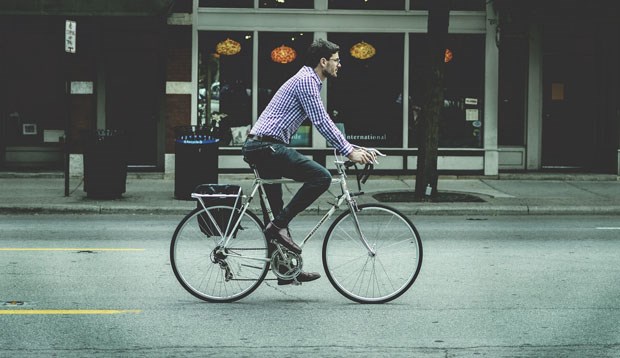As I was driving back home from a conference yesterday, I couldn’t help but notice the guy on the bike who was steadily moving through all the traffic that had jammed all of us in one spot.
Neil Pope, a member of the Delta HUB group, enjoys riding to work in Richmond. His route takes him along the Boundary Bay dike and Ladner's farm roads. To get through the tunnel, he takes the (free) Massey Tunnel bike shuttle, located at the Town and Country Inn. Once on the Richmond side, his route includes roads with good bike lanes and an off road trail. He heard about the bike shuttle from some friends who were using it. "Try it. You might get hooked" said Neil.
While cycling to work or school isn’t feasible for many due to their long commutes, and family commitments, it could be embraced by more than those who currently choose it. I know I am certainly one of them.
Our cities have evolved around car-centric mobility and we rely heavily on our personal vehicles as they have been the key to our prosperity. We have made our cities so unfavourable to any other way of mobility that most of us have a hard time imagining what an alternative system would look like.
When we fill gas in our car, it is becoming more evident that the days of low cost energy are slowly coming to an end. As oil becomes scarce and air pollution rises, we are finally waking up to the reality that our automobile-centric culture isn’t sustainable.
The transportation sector in Canada is responsible for about one quarter of all greenhouse gas emissionsthat impact the health of our environment and ultimately our health. Carbon dioxide levels are the highest in 500,000 years and only increasing. It is high time we reconsider burning fossil fuels as the only way to meet our transportation needs.
Active transportation by way of walking, cycling and public transportation will only get more popular as gas prices increase and as the negative impacts of our car-centric culture escalate.
In about another 15 years 1-in-4 Canadians will be 65+ years-old, and in the last 20 years we have seen a two or three times increase in chronic diseases such as asthma, diabetes, depression and heart disease.
Physical activity is one of the most effective “treatments” for chronic diseases. Many British Columbians want to stay healthy by incorporating physical activity in their lives from the many benefits it provides.
We know that how we travel impacts our health. Active modes of transportation such as cycling allow people to get the exercise they need while travelling to work or school.
Cycling is a sport which gives us an enormous sense of freedom and is therefore beneficial for our mental health as well.
Having said that there is no doubt that not everyone can get to their destination by walking or cycling. In addition, the fear and stress associated with riding a bicycle mixed in with motor vehicle traffic is the primary deterrent to cycling. Over 40 per cent of people want to cycle but currently don’t, and for many of them it’s because they are scared of unsafe road conditions. According to TransLink market research, over 94 per cent of current and potential cyclists in Metro Vancouver prefer to cycle away from motor vehicle traffic.
With fewer cars and reduced congestion, those who have no choice but to use their vehicles will have an easier time getting around resulting in safer roads for both drivers and cyclists.
There are positive consequences in all of this for the environment, health, vulnerable citizens and the livability of our cities.
Our cities are continuing to make investments in our cycling infrastructure. However those investments are lagging behind to the realities cyclists, pedestrians and other vulnerable road users’ experience.
Making cycling safer is the responsibility of legislators, drivers, cyclists and the community at large. “Infrastructure such as bicycle lanes, separated bicycle paths, and bicycle boulevards, along with traffic calming measures and bicycle right-of-way policies, can encourage cycling for everyday travel and make cycling safer,” says Korine Deol, an environment health officer from Fraser Health.
The power of citizens and community to create health is far greater than any physician, clinic or hospital.
Bike to School & Work Week is just around the corner from May 28 to June 3. Let us make a statement by riding our bikes to school and work during the Bike to School & Work Week and join those that are already on this journey, to normalize biking as a way of transportation in our city of Delta.
If you want to be a part of the active transportation solution in Delta check out https://bikehub.ca/delta
Sepia Sharma lives and works in Delta and feels passionate about the role vibrant and inclusive communities play in enhancing community health. She has over 20 years of experience in community development and is currently working as a community health specialist with Fraser Health.



